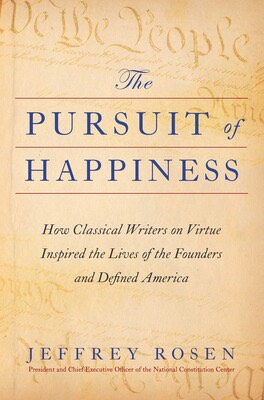Interfaith Insight - 2024
Permanent link for "Pursuit of Happiness as a Quest for Virtue," by Douglas Kindschi, Founding Director of the Kaufman Interfaith Institute, GVSU on March 12, 2024
Thomas Jefferson wrote to the head of a boarding school who had requested “a moral morsel” to be shared with the students as something they “should keep ever in their eye.” Jefferson emphasized the wisdom of Cicero in his response: “If the Wise, be the happy man, as these sages say, he must be virtuous too; for, without virtue, happiness cannot be."
The founders of our nation, including Jefferson and others who drafted the Declaration of Independence, understood “the pursuit of Happiness” differently than we do today. The famous sentence, “We hold these truths to be self-evident, that all men are created equal, that they are endowed by their Creator with certain unalienable Rights, that among these are Life, Liberty and the pursuit of Happiness,” was more aspirational than descriptive. It certainly was not true for those held in slavery, and it wouldn’t become true for women’s right to vote for over another one hundred years.
Jeffrey Rosen, president of the National Constitution Center, published this year his book, The Pursuit of Happiness. He discusses how happiness has changed its meaning since our nation’s founders, who were very influenced by Cicero and classical writers, and who saw the pursuit of inner happiness as a pursuit of virtue rather than the mere feeling of happiness.
Jefferson along with John Adams and Benjamin Franklin, who were also on the committee drafting the Declaration, were well-read in the classics including Cicero, Seneca, and Marcus Aurelius. Their writings on the pursuit of virtue were influential and framed the founders’ understanding of pursuing happiness. Classical moral philosophy was studied by them and was an important part of the curriculum until the mid-1900s. Happiness was framed in terms of being good rather than feeling good.
The classical understanding of the pursuit of happiness is summed up by Rosen as “being a lifelong learner, with a commitment to practicing the daily habits that lead to character improvement, self-mastery, flourishing, and growth. … Happiness is always something to be pursued rather than obtained — a quest rather than a destination.” He quotes Cicero: “The mere search for higher happiness, not merely its actual attainment, is a prize beyond all human wealth or honor or physical pleasure.”
Rosen writes that happiness does not come from controlling external events, but from a focus on controlling “our own thoughts, desires, emotions, and actions.” He relates this to the Eastern wisdom traditions of Buddhism and Hinduism. John Adams found great interest in discovering that Pythagoras, one of the founders of Greek moral philosophy, in his travels to the East studied with Hindu masters. For our nation’s founders, pursuing happiness included reading from the wisdom traditions of the East and the West, and the texts of the Bible.
Cicero wrote over 2,000 years ago but significantly influenced our nation’s founders. He also wrote that “Gratitude is not only the greatest of the virtues, but the parent of all of the others.” Today the science of positive psychology is learning the power of gratitude and its relationship to happiness. The Insight referenced last week pointed to many of these studies as well as to the influence of the world’s religions.
Whether we understand it through the science that studies the virtues, or the impact of the classical writers on our nation’s founders, or realize it as a part of our religious beliefs, gratitude and the pursuit of the virtues are fundamental to true happiness and living a life with meaning.


